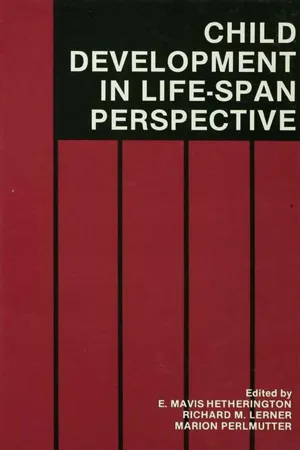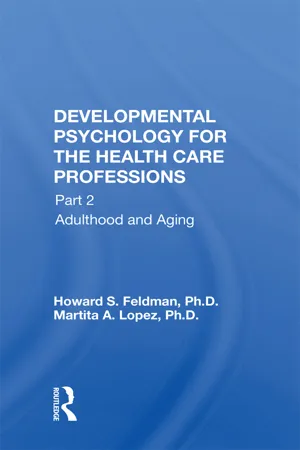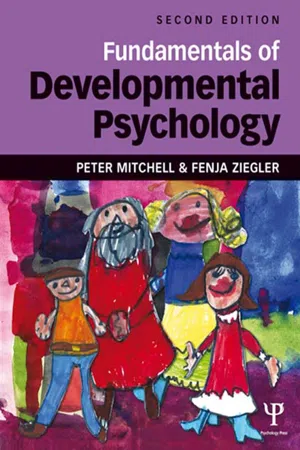Cognitive Development in Adulthood
Cognitive development in adulthood refers to the changes and growth in mental processes and abilities that occur as individuals age. This includes aspects such as problem-solving, decision-making, and memory. While some cognitive abilities may decline with age, others, such as wisdom and expertise, may continue to develop. Factors such as lifestyle, education, and social engagement can influence cognitive development in adulthood.
5 Key excerpts on "Cognitive Development in Adulthood"
- eBook - ePub
- E. Mavis Hetherington, Richard M. Lerner, Marion Perlmutter, E. Mavis Hetherington, Richard M. Lerner, Marion Perlmutter(Authors)
- 2013(Publication Date)
- Psychology Press(Publisher)
...Memory, for example, keeps track of events that have occurred in different times and distant places. Intellectual skills enable us to reflect upon experiences and to attach meaning and significance to them. As individuals, this ability gives us the power to anticipate and plan for the future, to develop strategies, to hypothesize alternatives, and to evaluate consequences. In addition, we can share our perceptions, thoughts, hunches, and interpretations with other people. As a species, this ability gives us the power to profit from a wide variety of skills and a great diversity of experiences. Cognition, then, is of fundamental importance. It underlies all personal adapation and all societal progress. But cognitive abilities are not fully formed at birth; nor do they remain entirely stable throughout adulthood. All age-related changes in cognition that occur throughout life are referred to as cognitive development. These life-span changes in cognition have been studied extensively by basic and applied researchers, by educators, and by clinicians. Some have focused primarily on the changes that occur during childhood and others on the changes that occur during adulthood. Moreover, different subgroups work from alternative theoretical perspectives. Of even greater significance, however, these different subgroups seem to study separate aspects of cognition; they use different methodologies and collect different types of data. The purposes of this chapter are to articulate an agenda for cognitive developmentalists and to evaluate how well it is being met. In order to do this, major perspectives on cognitive development are reviewed. A conclusion drawn from this review is that current perspectives are largely complementary, rather than competitive. Moreover, it is suggested that child psychologists studying cognitive development generally have limited themselves to a rather restricted portion of this domain...
- eBook - ePub
Developmental and Educational Psychology for Teachers
An applied approach
- Dennis McInerney, David Putwain(Authors)
- 2016(Publication Date)
- Routledge(Publisher)
...CHAPTER 5 Cognition and cognitive development: infancy to late childhood Introduction In the last two chapters we have considered the physical growth of children from early childhood through to early adulthood. We noted that cranial growth during the early childhood years is very significant and by the age of five years has achieved 75% of its adult size. The development of the brain is directly related to the development of motor coordination and a number of other developmental trajectories. Accompanying this cranial growth is also the development of cognition. Cognitive development is the development over time of the ability to think and reason and to understand the world in which we live. A knowledge of cognitive development is essential for teachers and educators. Does a child think in the same way as an adult? How does a child process information? When can we expect a child to perform particular mental processes? What is intelligence? What is creativity? Can we measure these? What influences cognitive development? These, and many other questions, are of central importance to educators. What is cognition? Broadly, cognition refers to the intellectual activity of an individual, i.e. the mental processes; involving all aspects of thought and perception. As with the development of the physical structures of the body, the major cognitive processes that are inherent in being human, mature in an orderly way in children provided the environment contains the normal experiences of childhood such as social interaction, environmental stimulation, and good diet. In other words, a child in any normal environment will develop a full range of cognitive capacities...
- (Author)
- 2020(Publication Date)
- Wiley(Publisher)
...Cognitive Aging, Assessment of F. R. Ferraro University of North Dakota What is Cognition? As discussed in “Assessment of Cognitive Processes and Abilities, General Features and Methodological Issues” (Ferraro, in press), cognition is how individuals think, problem solve, make decisions, speak, walk, and perform a whole host of information processing activities. Since many of these information processing activities are internal mental representations of actual events, one must be careful regarding how one measures these actions and processes. Reaction time (RT) is one of the most common methodologies employed to measure and study internal mental representations. Likewise, RT is often one of the more controversial methodologies. What is Aging? By definition, adulthood and aging is the period from approximately 20 years of age until death. Developmental psychologists, by comparison, study aging (i.e. there are chapters dealing with late‐life‐development in many developmental textbooks) but they also study pre‐natal and pre‐adulthood development phases of life. Aging can actually be broken down into various subcomponents which include early adulthood, middle adulthood, and late adulthood. The actual age ranges of these subcomponents vary, but it is generally agreed upon that early adulthood ranges from 20–40, middle adulthood ranges from 40–60 and late adulthood ranges from 60–death. As mentioned, these ranges are variable, most likely due to longevity and life‐expectancy issues. For instance, life expectancy for both men and women increases each year. Furthermore, there are more centenarians (those who live to be 100 years of age or older) in the United States and one of the fastest growing age groups currently are those individuals aged 65 and above as well as those 85 and above. Thus, middle age 30 years ago is vastly different from current middle age...
- eBook - ePub
Developmental Psychology For The Health Care Professions, Part Ii
Young Adult Through Late Aging
- Howard. S. Feldman(Author)
- 2020(Publication Date)
- Routledge(Publisher)
...5 Cognitive Processes in Later Adulthood The study of intellectual and mental processes in old age is a major part of the psychology of aging. Traditionally, these cognitive processes are divided into topics such as memory, learning, problem-solving, and so on However, it should be remembered that these distinctions are largely conceptual and break down rapidly as one becomes better acquainted with the nature of the processes. For example, it is very difficult to test learning without also assessing memory, as learning involves acquisition of knowledge and memory involves storing and then retrieving it. Significantly more attention is devoted to these particular processes in the elderly than in young and middle-aged adults. The reason for this difference is the greater rate of change investigators have found in later adulthood. The changes themselves are gradual and often begin in middle age or even as early as the 20s. They may be noticed by the individual only very late in life and may cause little or no functional loss. Those changes that are the hallmarks of advanced age are minor loss of memory function and slowing of motor performance. Sensation and Perception Sensation and perception are often discussed as though they were two separate processes, but, like learning and memory, they are so closely related that it is difficult to discuss them separately. Sensation may be defined as input from physical stimuli; perception refers to the interpretation of sensory information. Age-related declines in both sensation and perception have been documented. Sensation Vision is one of the major areas in which research on the relationship between age and the senses has been conducted. Most deficiencies in vision with age can be traced to physiological changes such as reduced pupil size, loss of lens transparency, and reduced lens elasticity (McKenzie 1980)...
- eBook - ePub
- Peter Mitchell, Fenja Ziegler(Authors)
- 2013(Publication Date)
- Psychology Press(Publisher)
...Chapter 3 DOI: 10.4324/9780203736357-3 Contents Introduction Stages of cognitive development Piaget’s explanation of cognitive development Traditional learning theory as a contrasting explanation of development A supplement to Piaget’s theory: Self-centered adolescents Summary The development of thinking 3 Chapter Aims To introduce Piaget’s theory of cognitive development. To detail Piaget’s stages. To detail the evidence that lends support to Piaget’s stage theory. To present the mechanism that Piaget posited as responsible for cognitive development. Introduction The discipline concerned with studying the development of thinking is cognitive developmental psychology. The word “cognitive” refers to knowledge, but not necessarily according to the common meaning of the word. When people talk about knowledge, they usually mean the kind of information useful for answering questions in games such as The Weakest Link or Who Wants to be a Millionaire, or in order to do college exams. In contrast, cognitive developmentalists think of knowledge as referring to understanding about things. You might have noticed a child aged around 5 years speaking on the telephone about things only he can see: He seems to overlook the fact that the person he is speaking to is in a completely different location and cannot see the same things. Perhaps this is a sign that the young child is incapable of putting himself in someone else’s shoes. In the broadest sense, it is tempting to suppose that the child does not understand that other people can have different perspectives. Cognitive developmentalists look at particular difficulties children have, such as poor communication ability, and then draw general conclusions about their underdeveloped knowledge of the world...




